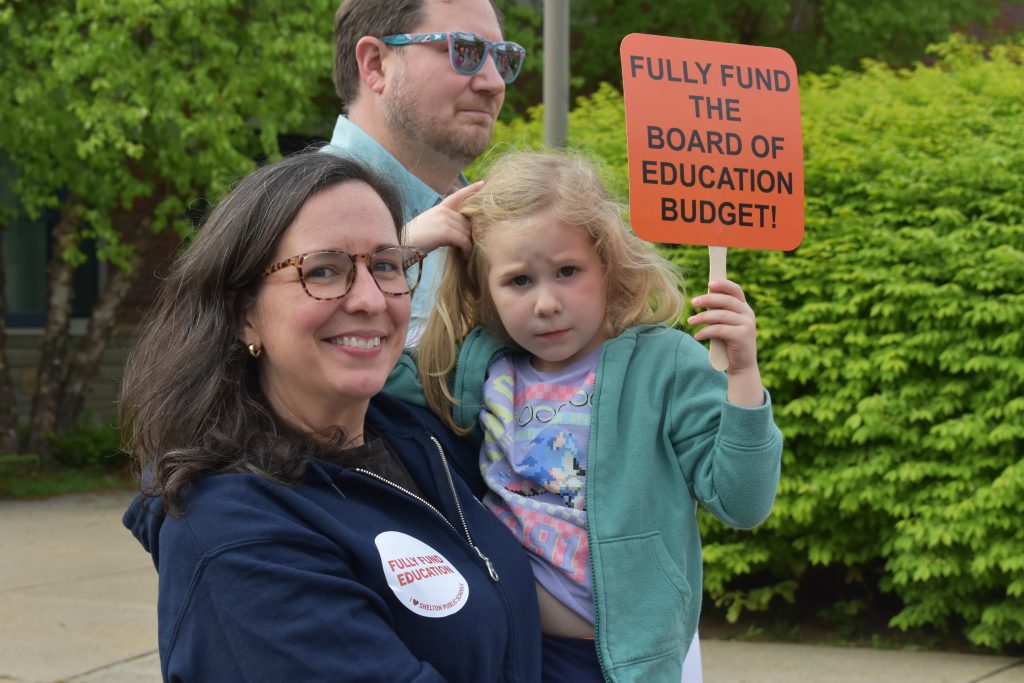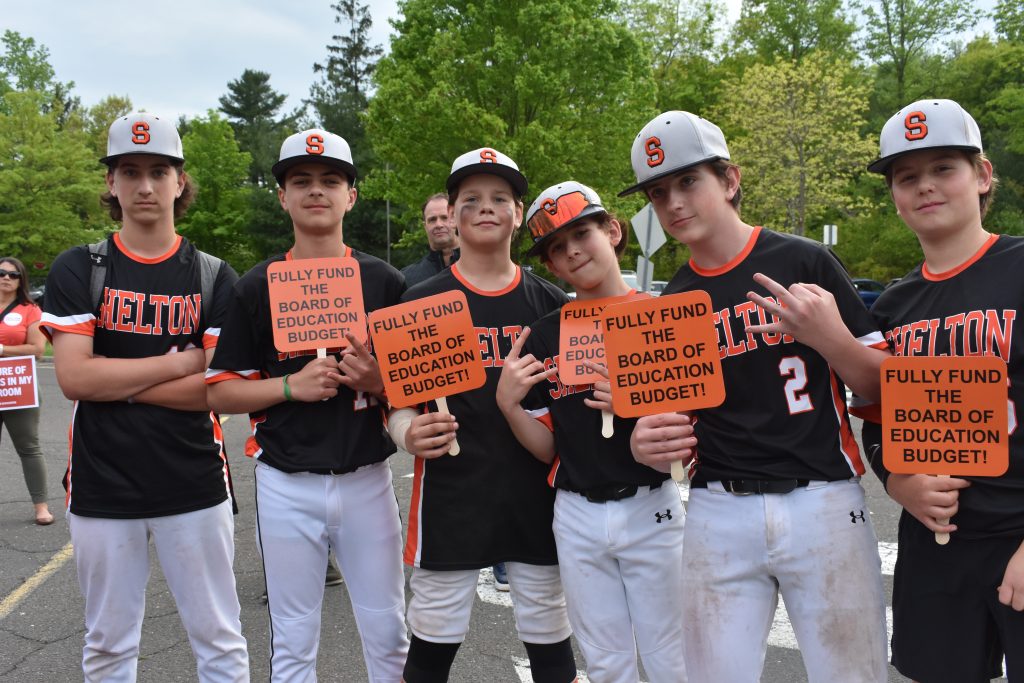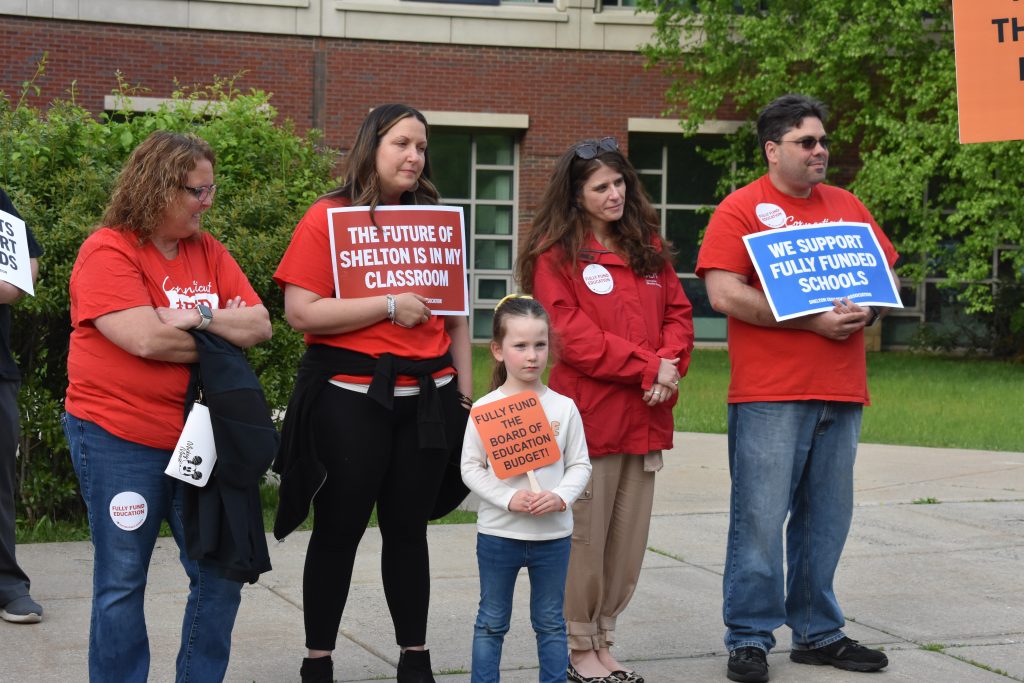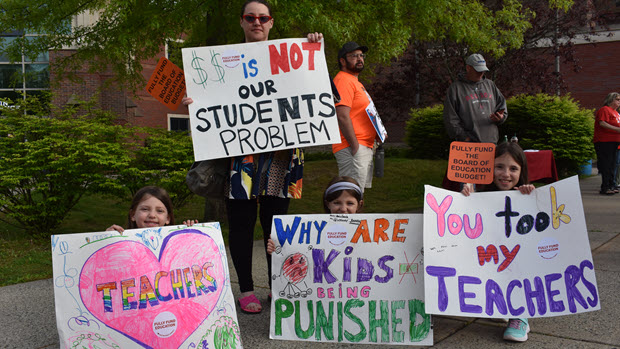Shelton schools have been down this road before.
The Board of Education presents a modest budget. The mayor and Board of Aldermen make cuts. The following school year, a shortfall is recognized, and although student enrollment in the city continues to rise, staff are asked to absorb the shortfall.
Since 2018, according to data tracked by the Shelton Board of Education, more than 70 education positions have been cut.
“Our teachers are exhausted by this cycle of higher costs and increased cuts year after year, and we’re not alone,” said 20-year veteran teacher and Shelton Education Association President Joann Allen, at a rally attended by more than 100 supporters ahead of a Board of Aldermen meeting last night. “Shelton parents, students, and community members are with us. We are anxious, frustrated, and tired of this pattern of underfunding year after year. In 2009 teachers took a furlough, but that didn’t solve the problem. We lose staff through attrition each year, our class sizes grow, and our students suffer. You can’t put students first if you put teachers last. We’re here to give our students the bright future we keep promising them.”
 Indeed, unstable school budgets year after year and the resulting teacher churn have a profound effect on schools and student performance for a number of well-studied reasons. Research from the University of Michigan has found that teacher layoffs–even the threat of reduction-in-force notices–correlate with higher teacher stress, diminished student achievement, and lower test scores in math and English.
Indeed, unstable school budgets year after year and the resulting teacher churn have a profound effect on schools and student performance for a number of well-studied reasons. Research from the University of Michigan has found that teacher layoffs–even the threat of reduction-in-force notices–correlate with higher teacher stress, diminished student achievement, and lower test scores in math and English.
“You wouldn’t all be here if you didn’t realize that the mayor’s proposed budget that the aldermen are currently working on will result in the decimation of our education system,” said Shelton business owner and longtime school board member and chair Mark Holden. “We’ve had years of starvation budgets in education in this city. In spite of meager budgets, we’ve always hired the best educators we could find, which is how we’ve managed to deliver an outstanding education. But as it stands, we’re going to lose dozens of teachers if the budget isn’t fixed, and that will have a terrible toll on our students.”
One of those students, a third-grader named Violet, took the mic.
“In the middle of the year, it really hurt my feelings to see so many of my teachers being taken away when they have important jobs in my school,” she said. “Now we don’t have any academic support specialists, and we also lost our substitutes, so other teachers in the school have to take up those responsibilities. I’m here today to help and try to bring back those teachers.”
Caught in the middle
Not only was the education budget slashed and teacher layoffs announced, but those layoffs went into effect immediately, in May, rather than in the next school year–leaving some students without key supports and putting teachers in positions as “subs” in their own jobs. At the elementary level, Shelton elementary music and art teachers are being split among schools with 500-600 children, struggling to provide the quality learning experiences their students deserve.
 “In my 24 years as a teacher, I’ve never once heard of teachers being laid off in the middle of the year,” said Trumbull educator Marie Tavella, who has three children in Shelton schools. “My children lost four of their teachers from Blue Hills School. My third-grader was directly affected by the loss of a teacher who led a reading group that challenged her. It’s absurd that following state mandates for special education should have a negative impact on children and deprive them of the very teachers they need. The state needs to step up with excess funding to meet special education needs, and our town needs to step up too. As a Shelton taxpayer, I’m willing to pay more money for the future of my kids. Funding education boosts property values too. We’re in real trouble if this doesn’t get reversed.”
“In my 24 years as a teacher, I’ve never once heard of teachers being laid off in the middle of the year,” said Trumbull educator Marie Tavella, who has three children in Shelton schools. “My children lost four of their teachers from Blue Hills School. My third-grader was directly affected by the loss of a teacher who led a reading group that challenged her. It’s absurd that following state mandates for special education should have a negative impact on children and deprive them of the very teachers they need. The state needs to step up with excess funding to meet special education needs, and our town needs to step up too. As a Shelton taxpayer, I’m willing to pay more money for the future of my kids. Funding education boosts property values too. We’re in real trouble if this doesn’t get reversed.”
Consistently not supporting a budget creates uncertainty and panic, added CEA UniServ Rep Brett Pickerign. Among other things, layoffs could create compliance issues related to students’ IEPs. In Shelton, class sizes have risen from an average of 17 students to as many as 28.
“This is not an issue of low student enrollment, and it’s not an issue of high mill rates,” Pickerign explained. “At around 17 or 18 mills, Shelton’s rate is very low.”
SEA members, parents, students, and community supporters turned out in force to push for a responsible education budget. Noting that a vote will take place next Thursday, May 23, Holden urged rally participants to call their aldermen and remind them, ‘I can’t vote for someone who isn’t going to do what’s best for our city.’”
Getting back on track
“CEA has your back,” CEA Vice President Joslyn DeLancey reminded rally participants. “I am so proud to see the turnout here to ensure that Shelton does the right thing for its students. Our school system is the single most important investment our cities and towns can make, and we should not be cutting teachers. Cutting teachers midyear, no less, shows a lack of planning and commitment to our students. The budgets we put forth should support a thriving, dynamic school system, and that’s what Shelton deserves.”
 “We’re trying to get the positions that were cut restored,” said Allen, “and we’re here to support the Board of Education and keep our message very positive. We have school interventionists speaking about why their positions are important. Early intervention is key and will save our district money down the road, but more importantly, it will give those students who are struggling the success and confidence to do better. So we’re here to work together to solve our budget problems, keep our schools strong, and try to figure out why this underfunding keeps happening.”
“We’re trying to get the positions that were cut restored,” said Allen, “and we’re here to support the Board of Education and keep our message very positive. We have school interventionists speaking about why their positions are important. Early intervention is key and will save our district money down the road, but more importantly, it will give those students who are struggling the success and confidence to do better. So we’re here to work together to solve our budget problems, keep our schools strong, and try to figure out why this underfunding keeps happening.”
Speaking before the Board of Aldermen, longtime BOE member and chair and retired teacher Kathy Yolish noted, “You would not be where you are today without a teacher, a paraeducator, a school counselor. Educators make every other profession possible.”
She challenged every alderman to spend an entire day shadowing a teacher, a paraeducator, an administrator, a nurse, or a maintenance worker from their arrival at school until the moment they leave the building, reminding them that the work of an educator often continues at home, into the night.
“In the wake of COVID,” she reminded them, “that work has become even more difficult.”
“We give teacher coffee mugs calling them superheroes,” Shelton parent Lyndsay Murphy told the Board of Aldermen. “We talk about their patience and the incredible things they coax out of our children and the fact that they are hard-working, caring, amazing humans. My kids quite literally spend more waking hours at schools than they do with me. But teachers aren’t superheroes. They can’t be in multiple places at once. Try as they might, they can’t hypnotize 25 kids to behave at the same time. They need our support. Let’s support the people who support our kids.”







